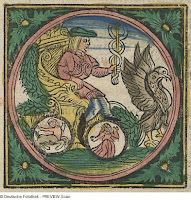WINGED WORDS WEEKLY
Compiled & Edited by Rob Chappell
(@RHCLambengolmo)
Editorial Associate: Sabina Saelind
Editorial Assistant: Jessica Breckinridge
Vol. 3, No. 39: Week of August 7, 2024
August Theme: Ancient Wisdom
Episode #1: Introduction
Editor’s Note
I would like to
begin the new month of blog postings with a warm welcome to two new blogging
colleagues! Sabina Saelind joins the blog this month as our new Editorial
Associate, and Jessica Breckinridge is assuming the role of Editorial
Assistant. Both of them are wonderful loremasters (lambengolmor
in J. R. R. Tolkien’s Elvish language), and I look forward to seeing their
edutaining contributions to our blog in the coming weeks and months. I also
wish to extend my sincere thanks to Skylar Sonnenschein, our previous
Editorial Associate, who has recently been reassigned as Special Assistant
to the Editor for Social Media Projects.
During the month
of August, our blogging theme will be “Ancient Wisdom” – the continuing quest
to learn from the past so that we can build a better future for the entire
human family (and the planet Earth as a whole). This week, we begin with two
poems from our blogging staff writers, and we continue with a commentary on a
couplet and some further reflections on learning from the ancients.
Two Introductory Poems
“An Invitation to the
Ancient Wisdom”
By Lenaea Bifrost
Studying the ancients for wisdom and gain,
Guiding like Socrates or Plato, their brain.
From Homer to Hesiod, and onward they go,
The words of the past shed light on our foe.
The wisdom they share is timeless for all,
From their writings gleam insights, a call.
“The Light of
Yestermorrow”
By Daphne Silvertine,
Staff Writer
In the shadow of ancient wisdom,
We find the keys to our tomorrow.
In the stories of our ancestors,
We weave the threads of our journey.
Let us listen to their whispers,
Let us learn from their experience.
In their triumphs and defeats,
We find the lessons that endure.
For the past is the teacher,
The present is the classroom.
And the future is the prize,
The gift that awaits our learning.
So let us study the masters,
Let us honor their wisdom,
And let us carry their torch,
As we build a better future.
Gilgamesh (pictured above), the hero of the Gilgamesh Epic and other
ancient Near Eastern legends, was regarded not only as a mighty warrior but
also as a teacher of wisdom. (Image Credit: Digital artwork created by the
Editor.)
Why Study the Wisdom of the Ancients?
“For a life worthy
to be lived is one that is full of active aspiration, for something higher and
better; and such a contemplation of the world we call meliorism.” à Paul Carus (1852-1919): Monism
and Meliorism
“I'm not an optimist;
there's too much evil in the world and in me. Nor am I a pessimist; there is
too much good in the world and in God. So I am just a meliorist, believing that
He wills to make the world better, and trying to do my bit to help and wishing
that it were more.” à Henry Van Dyke (1852-1933): Pro Patria
“The Ancient Wisdom of Omnism”
A Couplet by the Editor
With Commentary by Tara Dunsany, Staff Writer
Editor’s Note:
In 2003, when I was reading The Gospel of Sri Ramakrishna, I felt
inspired to write the following couplet, which was prompted by my recollection
of a saying from the ancient Greek philosopher, Heraclitus of Ephesus (ca.
535-475 BCE): “One who hears not me but the Logos will say, ‘All is One.’”
“The One has countless
names and faces,
Throughout all times and
sundry places.” à RHC
This brief, yet powerful poem by our beloved Editor highlights several key tenets of the Omnistic philosophy of religion, especially the idea of an underlying oneness connecting all beings, both past and present.
In the first line,
the poem references the “One” – the Entity
behind all of creation, symbolizing the interconnectedness of every living
thing. The second line further clarifies this concept, mentioning the diverse
disguises that the One dons when appearing to sentient beings, suggesting the
numerous forms and faces the Divine Presence can manifest into through time and
space.
The usage of “countless”
when referring to faces and places is a reminder of the infinite nature of the
One, as well as the vastness of Its existence. This idea of the One's
omnipresence aligns with the Omnistic philosophy, which asserts the Divinity as
being present within all entities, even the most minuscule and mundane aspects
of reality (panentheism).
The closing line
further emphasizes the concept of the One taking various forms in the world,
which is a core belief of Omnism, asserting that the Divine can be found in all
religious & spiritual paths, regardless of Its disguises. The idea of a
unifying Presence behind the diversity of names, faces, places, and times is a
central theme in this philosophy, reflecting the universalistic and syncretic
essence of its doctrine.
Editor’s Note:
Readers who desire to learn more about the Omnistic philosophy of religion are
encouraged to visit the website of the Ramakrishna Mission at https://belurmath.org/.
The Gospel of Buddha: Compiled from Ancient Records by Paul Carus
Chapter
100: “Praise of All the Buddhas”
All the Buddhas are
wonderful and glorious.
There is not their equal
upon Earth.
They reveal to us the path
of life.
And we hail their appearance
with pious reverence.
All the Buddhas teach the
same truth.
They point out the path to
those who go astray.
The truth is our hope and
comfort.
We gratefully accept its
illimitable light.
All the Buddhas are one in
essence,
Which is omnipresent in all
modes of being,
Sanctifying the bonds that
tie all souls together,
And we rest in its bliss as
our final refuge.
Srimala,
an Indian Queen, was ordained by the Buddha as a preacher of the Dharma. Her
profound teachings are recorded in the sutra entitled The Lion’s Roar of
Queen Srimala – a major scripture of the Mahayana Buddhist tradition.
(Image Credit: Digital artwork created by the Editor.)
Chapter 15 of the Tao Te Ching by Lao-Tzu
Translated by Kayley Novalis, Staff Writer
The ancient masters were profound and cryptic,
their words esoteric and perplexing.
Their doctrines are obscure, their teachings confusing,
their wisdom impenetrable.
Those who know don't tell;
those who tell don't know.
Empty your heart, fill your belly,
weaken your ambitions, and strengthen your bones.
Be humble, like an infant who knows nothing yet.
Be content, like a fool who wants nothing.
Canticle: “Sapientia Aedificavit Sibi Domum”
(Proverbs 9:1-6, JPS Tanakh 1917)
Wisdom hath builded her house, *
She hath hewn out her seven pillars;
She hath prepared her meat, she hath mingled her wine; *
She hath also furnished her table.
She hath sent forth her maidens, she calleth, *
Upon the highest places of the city:
‘”Whoso is thoughtless, let him turn in hither”; *
As for him that lacketh understanding, she saith to him:
“Come, eat of my bread, *
And drink of the wine which I have mingled.
Forsake all thoughtlessness, and live; *
And walk in the way of understanding.”
“Looking for Wisdom”
By Roberta Kirk-Novalis, Staff Writer
Seeking the wisdom of ages past,
We follow the traces left behind:
In stone, in word, and in the heart,
We learn with both our heart and mind.
Weekly Words of Wisdom
By Viviana Rivera, Staff Writer
Reading the works of the ancient
sages is like a spiritual feast, a nourishment for the soul. Their timeless
wisdom has stood the test of time and still has relevance today. I encourage
everyone to pick up a book by Marcus Aurelius (Meditations), Lao-Tzu
(Tao Te Ching), or one of their own favorite ancient philosophers
– and start reading!
Stoic Proverb of the Week
Contributed by Amy Kendrick, Staff Writer
From Epictetus' Discourses:
"It is not what happens to you that counts, but how you react to it."
This simple quote encapsulates a fundamental aspect of Stoic philosophy: the
idea that it is not external circumstances but our own judgments and reactions
to them that determine our happiness or unhappiness. In other words, we are not
in control of the events happening around us or even within us, such as
emotions, but we do have the power to control how we respond to them.






